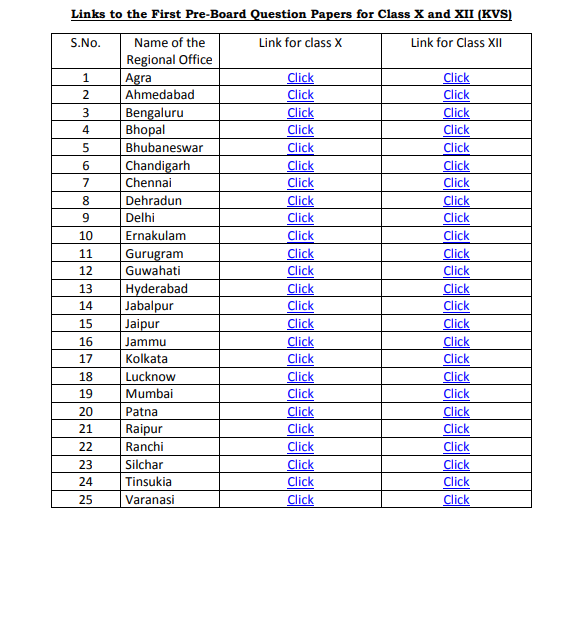
Sample Question Paper for Pre-Board Exam Preparation for CBSE Students: Strategies for Success
The preboard examinations are an essential milestone for CBSE students like the students of KVS, NVS, serving as a preparatory stage for the final board exams. These exams help students assess their readiness, identify areas of improvement, and familiarize themselves with the board exam pattern. While they may not directly affect a student’s academic record, they are critical for building confidence and improving performance in the final exams.
With proper preparation and focus, students can turn preboards into a valuable learning experience. This article provides actionable strategies for effective preparation, along with tips for managing stress and maximizing efficiency.
Importance of Preboard Exams
- Mock Test for Board Exams
Preboards replicate the actual board exam conditions, helping students understand the exam format, marking scheme, and time management. - Performance Assessment
They highlight strengths and weaknesses, allowing students to refine their study plan before the final exams. - Boosting Confidence
Performing well in preboards boosts confidence and prepares students mentally for the high-stakes environment of board exams. - Practice Under Pressure
Facing preboards trains students to handle time constraints and exam pressure effectively.
Strategies for Preboard Exam Preparation
1. Understand the Syllabus and Exam Pattern
- Review the CBSE Syllabus: Familiarize yourself with the complete syllabus for each subject. Identify topics with more weightage and prioritize them.
- Exam Pattern: Study the format of question papers, including the types of questions (MCQs, short answers, long answers), and marks allocation.
2. Create a Study Plan
- Develop a realistic and well-structured timetable covering all subjects.
- Allocate more time to challenging subjects or topics while maintaining a balance among all subjects.
- Include breaks to avoid burnout and maintain focus.
3. Revise Thoroughly
- Revision is crucial for retaining concepts. Dedicate time daily to revising previously studied material.
- Use mind maps, flashcards, and summary notes for quick revision of key points.
- Practice diagrams, flowcharts, and graphs for subjects like Biology, Economics, and Geography.
4. Practice Sample Papers and Previous Years’ Question Papers
- Solve CBSE sample papers and previous years’ question papers to understand the nature of questions and improve speed and accuracy.
- Evaluate your answers to identify mistakes and learn how to improve.
- Set a timer while solving papers to simulate exam conditions.
5. Focus on NCERT Textbooks
- NCERT books are the foundation of CBSE exams. Ensure you thoroughly understand every concept and solve all exercises in the textbooks.
- Pay attention to the examples and in-text questions, as they are often directly included in exams.
6. Strengthen Weak Areas
- Use preboard exams as an opportunity to identify weak subjects or topics.
- Seek help from teachers, peers, or online resources to clarify doubts and strengthen your understanding.
7. Improve Time Management
- Practice completing sample papers within the allocated time for each subject.
- Develop strategies for allocating time to different sections of the paper, ensuring you answer all questions.
8. Utilize Online Resources
- Explore online tutorials, mock tests, and educational apps for additional support in complex topics.
- Platforms like CBSE’s official website provide sample papers, marking schemes, and subject-specific resources.
9. Group Study
- Studying in groups can enhance learning by encouraging discussions and sharing knowledge.
- Quiz each other on key concepts and work collaboratively on challenging questions.


Tips for Exam Day
- Read Instructions Carefully
- Take time to understand the question paper’s instructions before starting.
- Start with Easy Questions
- Begin with questions you are confident about to build momentum.
- Manage Time Effectively
- Allocate time to each section and avoid spending too much time on any single question.
- Review Your Answers
- Reserve the last few minutes to double-check your answers and ensure you have attempted all questions.
Managing Stress and Staying Motivated
1. Stay Positive
- Avoid negative thoughts and focus on what you can achieve with preparation.
2. Maintain a Healthy Routine
- Get sufficient sleep, eat nutritious meals, and engage in regular physical activity to stay energized.
3. Take Breaks
- Short breaks during study sessions can boost concentration and prevent fatigue.
4. Practice Relaxation Techniques
- Techniques like deep breathing, meditation, or yoga can help reduce anxiety.
5. Avoid Last-Minute Cramming
- Stick to your planned study schedule and avoid overloading your brain right before exams.
6. Celebrate Small Wins
- Acknowledge your progress and reward yourself for completing study milestones.
Common Mistakes to Avoid
- Skipping NCERT Books
- Many students prioritize reference books over NCERTs, which can result in missing out on fundamental concepts.
- Ignoring Weak Subjects
- Avoid focusing only on favorite subjects and neglecting others. A balanced approach is essential.
- Procrastinating
- Delaying preparation until the last minute can lead to unnecessary stress and incomplete coverage of the syllabus.
- Overconfidence
- Avoid taking preboards lightly, as they are crucial for identifying gaps in preparation.
Conclusion
Preboard exams are more than just a preparatory stage—they are an opportunity to fine-tune your study strategy and build confidence for the final CBSE board exams. By focusing on effective time management, consistent revision, and understanding the exam pattern, students can make the most of these exams.
Remember that preboards are a stepping stone, not the end goal. Use them as a learning experience to improve and excel in the board exams. With proper preparation, a positive attitude, and determination, success is well within reach.
